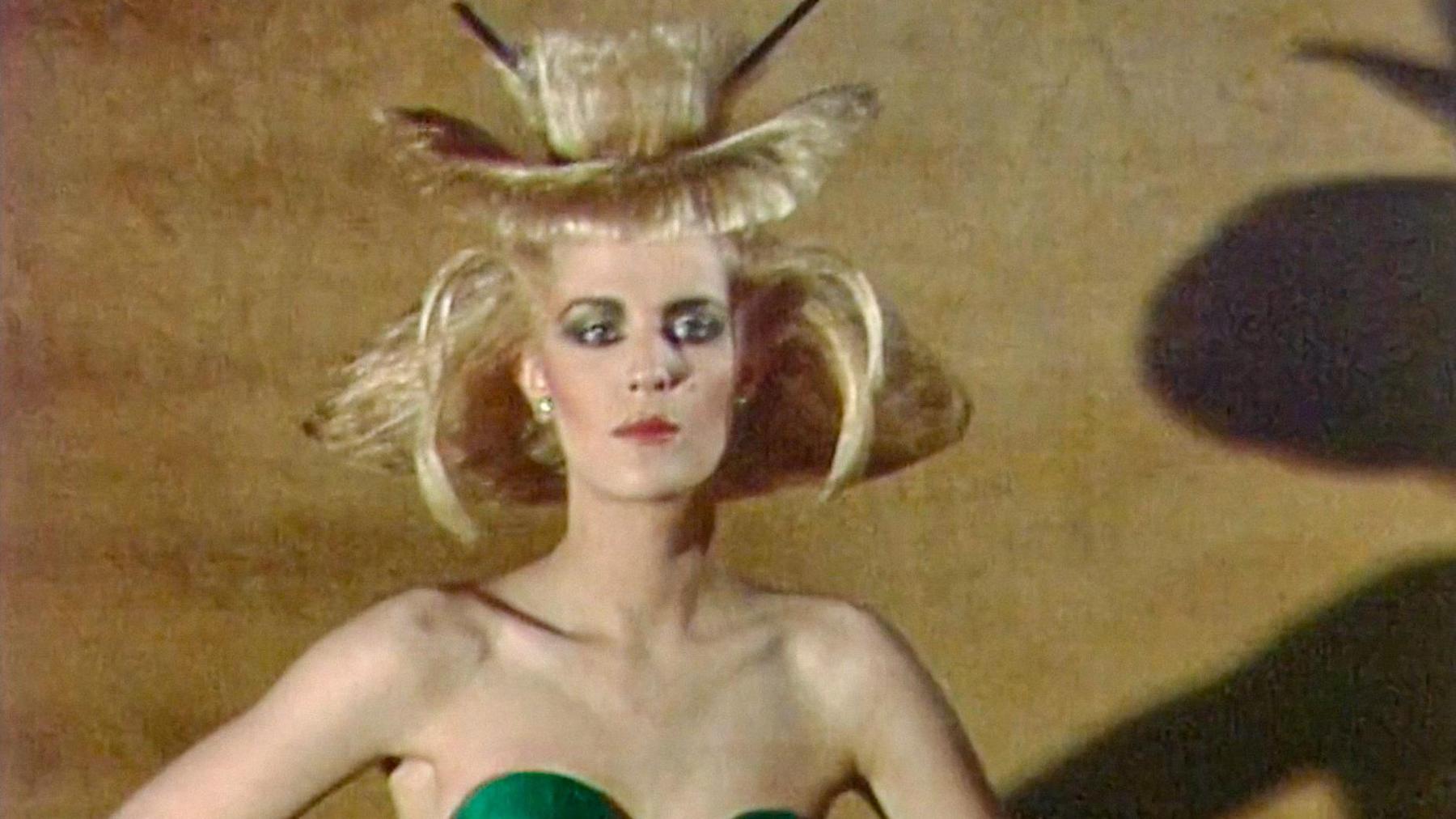
Avant-garde hairstyles are one of the many strange elements of British life highlighted in Shifty
The documentary filmmaker Adam Curtis gives a guide to some of the key moments from his new series Shifty.
In his documentaries, Adam Curtis has taken us everywhere from Russia during the breakdown of the Soviet Union, in TraumaZone, to the war in Afghanistan, in Bitter Lake.
Now Curtis, whose work has been called "dazzling" and "terrifying" by critics, has set his sights on Britain at the end of the 20th century for the five-part BBC series Shifty.
This time Curtis's signature style sees him use a bizarre array of archive clips to explore, he says, how "life in Britain today has become strange - a hazy dream-like flux in which no-one can predict what is coming next".
In Shifty, clips of the major players of the era – Prime Ministers Margaret Thatcher, John Major and Tony Blair – exist alongside surreal moments sourced from the BBC's extensive archives, like avant-garde hairdressing competitions, suburban line dancing parties and children hot-wiring a tractor.
To the uninitiated, his documentaries can feel impenetrable, so we spoke to Curtis to curate and explain some of the key clips from the new series.
Curtis also suggested a title for each clip that perfectly places viewers into the strange and murky world of Shifty.
'One of the few moments of honesty'
'The government adviser suspecting treachery'
One section details the rise of the musical remixes in the 1980s, and its societal implications – how, in Curtis's words, "we are trapped by a cascade of endlessly replayed images, songs, dreams from the past".
However, he admits, "that's the way this series was made, so I'm just as bad. If it's become a prison, I may be one of the jailers."
One way Curtis remixes the past is by reusing an interview with Sir Alan Budd that Curtis filmed for the 1992 documentary Pandora's Box.
In a remarkably honest interview, the one-time chief economic adviser to the Treasury during Thatcher's tenure worries that "the people making the policy decisions… never believed for a moment this was the correct way to bring down inflation.
"They did, however, see that it would be a very, very good way to raise unemployment, and raising unemployment was an extremely desirable way of reducing the strength of the working class."
"I've always been fascinated by that interview that Budd gave," says Curtis. "It's one of the few moments of honesty I've ever had from someone in power like that being interviewed."
'A past that was about to go'
'Bruno - the dog that is shifting sex'
As a young BBC employee, Curtis worked on That's Life. The show combined consumer affairs with lighter stories – most famously, a dog that could 'say' the word sausages.
Curtis credits his ability to juggle tragic and comic tones to this early role: "It showed me that you could go from a badly-built housing estate built on poisonous waste ground to a talking dog."
In Shifty, clips of societal unrest exist alongside Bruno, a dog who is, according to his vet, "changing his sex" – their male organs disappearing and their female ones developing.
Curtis says that it was Bruno's owner that drew him to the clip: "The way she's sitting and her hair," he says, "it felt like a past that was about to go."
Animals in his work can often represent our secret lives, he says – "they are these creatures who live with us who probably have a lot of hidden knowledge about us."
For Curtis, animals also counterpoint what he calls the "highly pretentious" elements of his work: "They just entertain people."
'A tragic figure'
'Margaret Thatcher's handbag and the ghostly perfume'
In this clip, an archivist at Cambridge University takes one of Prime Minister Margaret Thatcher's handbags out of a box, noting how the bag still smells strongly of her perfume.
Similarly, Thatcher's presence can be felt in much of the series, as we see the effects of her policies in the 1980s and 90s.
Before Thatcher became Prime Minister in 1979, Curtis argues there was "a collective model of society, where people came together in factories, were exploited, then realised they had power as a collective group."
He feels, however, that the closure of industries like mining led to "a society full of fragmented individuals who were powerful in the way they thought about their own desires, but actually on their own were powerless."
Despite this, Curtis sees Thatcher as a "tragic figure", who unleashed forces she could not control.
"She was the last politician who had an idea of how to change the country," he explains. "She wanted to create a society in which politics doesn't have as much effect as it did, and should allow individuals to be loose and free."
'Ever more irrational assumptions'
'In one universe, Stephen Hawking says goodnight to his child'
Another recurring character in Shifty is scientist Stephen Hawking, whose theories about multiple universes destabilised how we think about reality.
In putting together the series, Curtis began to think of Hawking in parallel to Thatcher, he explains.
"She believed that rationality applied through money would regenerate the country. He believed that the rational power of mathematics will lead you to a unified theory that will explain the whole world."
What fascinated Curtis about Hawking was how his seemingly rational theories led him to "ever more irrational assumptions".
"When he says that matter is eaten by black holes, other scientists say that cannot be true. So he says there must be other universes where they don't eat the matter, so it balances out. To me, that's absurd."
However, Curtis began to be touched by Hawking's humanity, like in a clip when we see him saying goodnight to his child.
'Very good trashy music'
'The revolution will be televised – in Swindon'
One of the threads of Shifty is what Curtis calls "the rise in confidence among people to talk about your own feelings, your own experience".
This is shown in one of the documentarian's favourite clips, which sees two boys in Swindon discussing the banning of the song Relax by Frankie Goes to Hollywood due to its sexual imagery. The clip, from one of a series of public access shows which allowed members of the public air time on the BBC in the 1980s, ends with one of the boys out of nowhere adding that the government should legalise cannabis.
In their willingness to criticise the BBC while appearing on it, we see a lack of deference to authority that Curtis thinks would have been unimaginable two decades earlier.
It also gave the filmmaker the chance to use the song Relax, one of a number of pop songs that feature in the series.
The song is central to the series's idea that the late 20th century in Britain was "wild and extraordinary, and had some very good trashy music in it, but it also unleashed a corrosive force".
.png)




